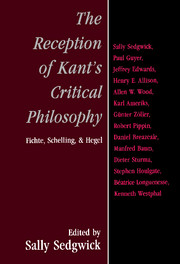Book contents
- Frontmatter
- Contents
- Notes on the Contributors
- Acknowledgments
- Introduction: Idealism from Kant to Hegel
- 1 The Unity of Nature and Freedom: Kant's Conception of the System of Philosophy
- 2 Spinozism, Freedom, and Transcendental Dynamics in Kant's Final System of Transcendental Idealism
- 3 Is the Critique of Judgment “Post-Critical”?
- 4 The “I” as Principle of Practical Philosophy
- 5 The Practical Foundation of Philosophy in Kant, Fichte, and After
- 6 From Critique to Metacritique: Fichte's Transformation of Kant's Transcendental Idealism
- 7 Fichte's Alleged Subjective, Psychological, One-Sided Idealism
- 8 The Spirit of the Wissenschaftslehre
- 9 The Beginnings of Schelling's Philosophy of Nature
- 10 The Nature of Subjectivity: The Critical and Systematic Function of Schelling's Philosophy of Nature
- 11 Substance, Causality, and the Question of Method in Hegel's Science of Logic
- 12 Point of View of Man or Knowledge of God: Kant and Hegel on Concept, Judgment, and Reason
- 13 Kant, Hegel, and the Fate of “the” Intuitive Intellect
- 14 Metaphysics and Morality in Kant and Hegel
- Bibliography
- Index
13 - Kant, Hegel, and the Fate of “the” Intuitive Intellect
Published online by Cambridge University Press: 03 December 2009
- Frontmatter
- Contents
- Notes on the Contributors
- Acknowledgments
- Introduction: Idealism from Kant to Hegel
- 1 The Unity of Nature and Freedom: Kant's Conception of the System of Philosophy
- 2 Spinozism, Freedom, and Transcendental Dynamics in Kant's Final System of Transcendental Idealism
- 3 Is the Critique of Judgment “Post-Critical”?
- 4 The “I” as Principle of Practical Philosophy
- 5 The Practical Foundation of Philosophy in Kant, Fichte, and After
- 6 From Critique to Metacritique: Fichte's Transformation of Kant's Transcendental Idealism
- 7 Fichte's Alleged Subjective, Psychological, One-Sided Idealism
- 8 The Spirit of the Wissenschaftslehre
- 9 The Beginnings of Schelling's Philosophy of Nature
- 10 The Nature of Subjectivity: The Critical and Systematic Function of Schelling's Philosophy of Nature
- 11 Substance, Causality, and the Question of Method in Hegel's Science of Logic
- 12 Point of View of Man or Knowledge of God: Kant and Hegel on Concept, Judgment, and Reason
- 13 Kant, Hegel, and the Fate of “the” Intuitive Intellect
- 14 Metaphysics and Morality in Kant and Hegel
- Bibliography
- Index
Summary
Kant's remarks on intellectual intuition captivated Schelling, Fichte, and Hegel, and the theme of intellectual intuition has entranced many Hegel scholars. Hegel's early Jena writings on Kant are complex, compressed, and cryptic. Nevertheless, I have become convinced that much of Hegel's interpretation of Kant at that time is in fact quite sophisticated and subtle, although often obscure and still developing. Understanding and learning from Hegel's early writings, however, requires overcoming widespread unclarity about the nature of “the” intuitive intellect. It is widely assumed that, because it is nondiscursive, an intuitive intellect is aconceptual. That is how Schelling understood it, and that is often the view of the early Hegel, too. Most commentators – whether sympathetic or critical – have followed them in this assumption. This is not, however, how Kant understood an intuitive intellect. As Moltke Gram has shown, Schelling and Fichte each have different accounts of “intellectual intuition,” their accounts differ from Kant's, and indeed Kant discusses three distinct views under the heading “intellectual intuition.” Kant's three accounts of an intuitive intellect are these: (i) an intellect that knows things in themselves independent of any conditions of sensibility, (ii) an intellect that creates its own objects, and (iii) an intellect that intuits the sum total of the whole of nature. Gram points out that these accounts are logically independent of each other. The first account only requires knowledge sans sensibility; it does not require that objects are created in the act of knowing them, which is the hallmark of the second account.
- Type
- Chapter
- Information
- The Reception of Kant's Critical PhilosophyFichte, Schelling, and Hegel, pp. 283 - 305Publisher: Cambridge University PressPrint publication year: 2000
- 8
- Cited by

